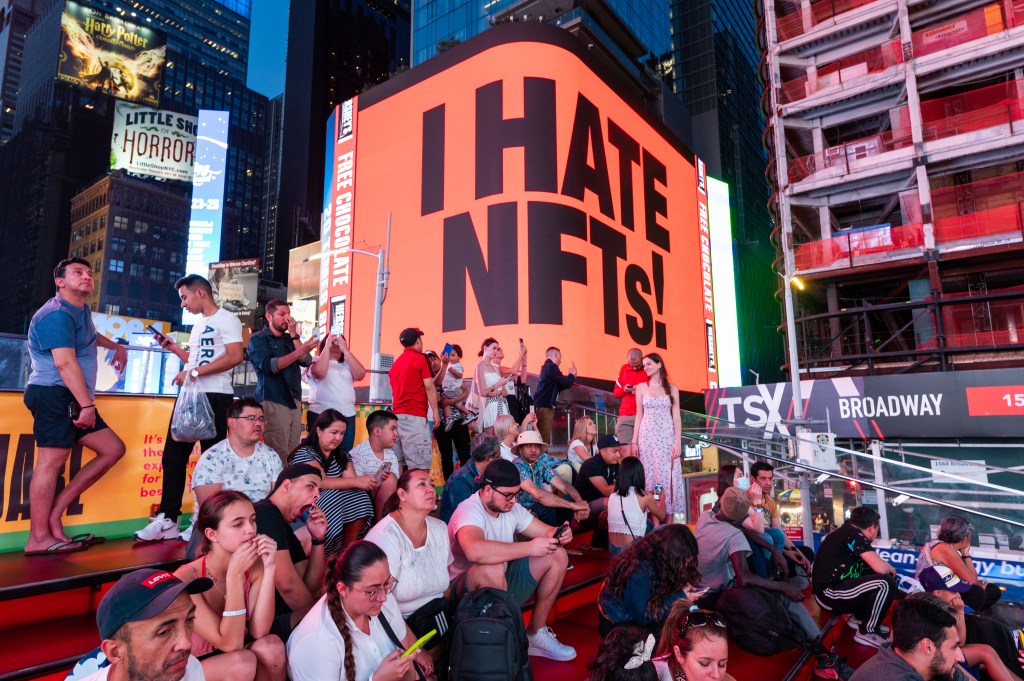The US SEC has brought its first enforcement action against a company for a non-fungible token (NFT) project. The company at the center of the SEC’s cease-and-desist order is a Los Angeles-based media and entertainment company called Impact Theory, which the federal securities regulator says sold NFTs that were actually unregistered securities.
In its lawsuit against Impact Theory, the SEC alleged that from October to December 2021 the company encouraged potential buyers of its NFTs to think of the tokens as investments in its future business, as it “created more projects” and promised these buyers that it was “trying to build the next Disney”.
“Our goal is to make sure that as Impact Theory is enriched, as [its founders] are enriched, as our team here at Impact Theory is enriched, that you guys also are enriched.”
Impact Theory
The company encouraged potential investors to view the purchase of the company’s NFT project as an investment into the business, stating that investors would profit from their purchases.
Impact Theory hosted several live speaking events on Discord (a voice, video, and text communication service), posted recordings of those events on the company’s Discord channels for the public to view, and shared information on its websites and social media channels, including YouTube.
Promises of value
Through those events and public statements, Impact Theory invited potential investors to view the purchase of these NFTs as an investment into the business, stating that the business’s expansion would deliver “tremendous value” to the NFT purchasers, and that the future value of the project would be significantly greater than their purchase price.
In addition, Impact Theory publicly shared its view that these purchasers, Impact Theory, and Impact Theory’s founders were all linked together in terms of their possible, future fortunes. For example, Impact Theory stated: “Our goal is to make sure that as Impact Theory is enriched, as [its founders] are enriched, as our team here at Impact Theory is enriched, that you guys also are enriched. And so that is why we are so aggressively behind NFTs.”
Given these statements, numerous prospective and actual purchasers stated on Impact Theory’s Discord channels that they viewed purchasing these NFTs as investments into the company and understood Impact Theory’s statements to mean that the company’s development of its projects could translate to appreciation of the NFTs’ value over time.
As a whole, Impact Theory raised around $30m from hundreds of investors, including those in the US.
Registration required
The SEC said this amounted to a sale of digital assets in the form of investment contracts, thereby making this a securities offering.
“Absent a valid exemption, offerings of securities, in whatever form, must be registered,” said Antonia Apps, director of the SEC’s New York regional office, in a press release. “Without registration, investors of all types are deprived of the protections afforded them by the robust disclosures and other safeguards long provided by our securities laws.”
Without admitting or denying the charges, Impact Theory settled with the SEC for more than $6.1m and will decommission the project, reimburse customers who bought the NFTs, and eliminate any royalties that it might collect from secondary market transactions.
Peirce and Uyeda shared their colleagues’ concern about the manner in which these NFTs were hyped up – to such an extent that customers purchased $30m of them without having a clear idea about how they would use or profit from them.
Dissenting opinions
Two of the five SEC commissioners dissented from the decision to charge Impact Theory, with Republican Commissioners Hester Pierce and Mark Uyeda saying the SEC should have addressed questions relating to guidance on NFT offerings before bringing an NFT enforcement action.
To be sure, Peirce and Uyeda shared their colleagues’ concern about the manner in which these NFTs were hyped up – to such an extent that customers purchased $30m of them without having a clear idea about how they would use or profit from them.
But they added: “This legitimate concern, however, is not a sufficient basis to pull the matter into our jurisdiction. The handful of company and purchaser statements cited by the order are not the kinds of promises that form an investment contract. We do not routinely bring enforcement actions against people that sell watches, paintings, or collectibles along with vague promises to build the brand and thus increase the resale value of those tangible items.”
Clarity on digital assets
The question of whether a particular offer of digital assets constitutes an offer of a security under federal law – and which test to use and characteristics must be present – is still a matter of debate.
The SEC has spelled out its understanding of this analysis using the Howey test (a test that alludes to a US Supreme Court case) specifically in its Framework for ‘Investment Contract’ Analysis of Digital Assets, which was issued in 2019.
On February 22, a federal judge in the Southern District of New York issued a first-of-its-kind order allowing a securities class action lawsuit to proceed against the issuer of NFTs on the grounds that the NFTs are securities for purposes of federal securities laws.
The order was issued in the context of a lawsuit against Dapper Labs, the creator and issuer of NBA Top Shot “Moments” – digital video clips of NBA game highlights and their associated NFTs minted by Dapper Labs.
“We will operate our go-forward business consistent with our good faith best understanding of all applicable laws, rules, and regulations, will make clear that all of Impact Theory’s digital assets are collectibles with utility.”
Tom Bilyeu, founder, Impact Theory
Moments are offered and sold on Dapper Labs’ proprietary digital platform, validated on Dapper Labs’ private blockchain and trade on a secondary marketplace controlled by Dapper Labs. The lawsuit claims that Moments are securities and Dapper Labs offered and sold those securities in violation of the registration requirements of the federal securities laws.
Dapper Labs filed a motion to dismiss the lawsuit, and the court rejected the motion, which at least lets the question of whether the NFTs in the case proceed to a courtroom hearing and decision.
Federal agency oversight
Lawmakers hope to add greater clarity here, too, offering a range of bills in Congress in the past few years to outline which federal agencies have oversight over which digital products, among other issues, such as the Lummis-Gillibrand Responsible Financial Innovation Act and the Digital Commodities Consumer Protection Act of 2022.
A recent bill with bipartisan support passed late last month by the House Financial Services Committee would define when a cryptocurrency is a security or a commodity and expand the Commodity Futures Trading Commission’s oversight of the crypto industry, while clarifying the SEC’s jurisdiction.
In the midst of the policy proposals, the SEC’s chair, Gary Gensler, has been under fire from Republican lawmakers for engaging in what they call rulemaking via enforcement at his agency when it comes to cryptocurrency.
Impact Theory responds
The company is not giving up on its NFT endeavor.
In an X (formerly Twitter) post, the founder of Impact Theory stressed that his company will ensure its future digital assets will be only be considered collectibles of utility and not financial instruments.
He said: “We will operate our go-forward business consistent with our good faith best understanding of all applicable laws, rules, and regulations, will make clear that all of Impact Theory’s digital assets are collectibles with utility within the exciting new landscape of Borderless Entertainment, and will fiercely discourage people from treating our digital assets as anything other than what they are – collectibles with utility. We will have more news on this in the coming weeks and months.”











